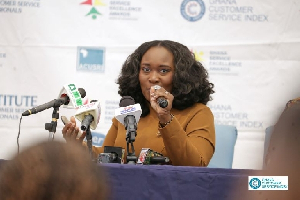General News of Monday, 21 August 2006
Source: Toronto Star
Ghana's gays battle AIDS underground
ACCRA, Ghana (Toronto Star) —Azumah Nelson (not the famous boxer) looks for a certain sway of the hips, a girlishness in the way a man gestures or smiles, a kind of subtle flirtation that gives away his preference for men. The effeminate ones will lead him to others, he knows.
Nelson, a self-acknowledged "effem" with chiselled cheekbones, curly eyelashes and a theatrical enchanté sort of handshake, is fronting a rather dire campaign in the gay community, approaching one gay man at a time with a warning. "We try to tell them that the menace is out there, that right now the menace is in Ghana," he said. That "menace" is AIDS. While the fight against AIDS in the West has always included the gay population, the prevention message has never really reached Africa's gays and lesbians, largely because they are nearly invisible on a continent where homosexuality is mostly illegal. "The problem has not even been talked about and because it has not been mentioned, they think it is not a problem at all," said Mac-Darling Cobinah, founder and executive director of the Centre for Popular Education and Human Rights in Ghana.Based on media reports, as well as posters and billboards sponsored by the Ghana AIDS commission and UNAIDS, he said, gay Ghanaian men and women got the impression that AIDS was confined mostly to prostitutes and cheating husbands and wives.
In the absence of formal prevention messages aimed specifically at gay men and women, Cobinah's group has gone underground to spread the word. Only South Africa and Kenya have made similar efforts to reach out to the gay community.
Five pairs of men, including Nelson, work as peer educators selling condoms and lubrication in five neighbourhoods across the West African nation's capital, targeting men they know or suspect are gay.
The work is not without hazards. Ghana, a politically stable but economically impoverished West African nation, is serious about sending an anti-gay message: two men discovered with gay pornography were sentenced to four years of hard labour in prison, and bail for a woman recently arrested for lesbianism was set at more than $1,000 (U.S.).
The funding for the centre's peer educator training came from a somewhat surprising source, the United States Agency for International Aid, or USAID, the official aid distributor for a country where gays are staging their own fight to widen their rights on issues such as marriage and adoption.
A small organization like the Centre for Popular Education, whose volunteer base is about 30 men and women, might be able to do more if large and powerful agencies like UNAIDS — the United Nation's agency charged with preventing the spread of the disease — took the lead, he said.
"No one talks about it and the experience all over the world shows that men who have sex with men are most at risk," Cobinah said.
"They always hide behind the law. They never want to talk about such issues," he added. "For some people, it's just ignorance. There's no law saying you can't talk about such issues."
Still, talking about homosexuality can be fraught with danger: exposing oneself as gay can lead to violence, as can wrongly identifying another man as gay.
The message is simple, said Nelson.
In fact, it's a spin on the usual A-B-C (abstain, be faithful, use condoms) campaign, and pairs condom use with the introduction of lubrication meant to make homosexual sex both more pleasurable and less likely to result in blood transfer.
(In a separate program, women are taught how to fashion their own dental dams out of locally purchased condoms.)
Statistics show it's working: the peer counsellors figure they've spoken to nearly 800 gay men in five Accra neighbourhoods, twice the target number the program hoped to reach. They've also sold nearly 18,000 condoms and more than 500 tubes of lubrication.
The demand for lube is the most obvious sign the message is getting through, Nelson says. When its price in stores was raised recently, counsellors were besieged with requests for cheaper tubes of the gel.
It's unclear how many gays in Ghana are infected with HIV. Overall, the country's AIDS rate is 3.1 per cent, a relatively small number compared to countries such as South Africa or Botswana, where more than 20 per cent of people are infected.
But because the gay community is largely hidden, it's difficult to track figures Since homosexuality is illegal, the Ghana AIDS commission does not collect statistics about sexual orientation.
"We know there are deaths weekly. There are a lot of funerals amongst the gay population," Cobinah said.
"They cannot be linked to AIDS, as there is no research to support it, but every week we have to attend a funeral of a gay in one of the regions."
A study conducted among more than 150 gay Ghanaian men in March 2004 showed the men considered anal sex safer than vaginal sex. They were also generally uneducated about sexually transmitted infections like gonorrhea and HIV.
In some ways, the campaign is lonely work. Azumah Nelson is a stage name, used only for work as a peer counsellor. Cobinah also sometimes uses a pseudonym. He struggles to keep the program going; in fact, it runs out of funding in September.
"If a member is arrested for selling condoms or lubrication, we don't have the means to represent that person in court," he said. "We don't even have enough funds to operate."
Selling condoms is not illegal in Ghana, but recently police have used carrying condoms as grounds for an arrest for prostitution.
Officially, Cobinah's group is devoted to human rights and advocates for more than greater freedoms for gays and lesbians.
Its small office — painted purple and surrounded by shanty homes, beauty parlours and makeshift auto body shops — is decorated with dozens of posters, some warning against the spread of AIDS, others opposing domestic violence, some pushing for greater rights for women.
If the plethora of rainbow flags weren't a clear tip-off, the DVD of Queer as Folk playing in the corner would be a sure indication of the organization's pro-gay tilt, yet many of the group's neighbours have no idea of its work or stance.
"It's not so much hidden as it's underground," he said. "We're trying our best to come out and be visible."
Karen Palmer is a Toronto Star freelance writer based in Africa.












